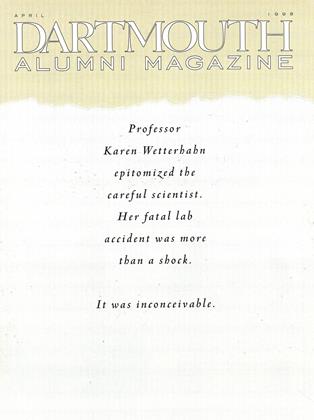Among the casualties of World War II was the French surrealist poet and popular radio personality Robert Desnos. Amember of the Resistance in Paris, Desnos was deported to Auschwitz and died of typhus shortly after liberation from Terezin in 1945. Eyewitnesses said he died with no possessions other than a pair of glasses. An obituary claimed there was a last poem:
I have dreamt so strongly of you
I have walked so much, talked so much
So much I have loved your shadow
That there now remains forme nothing more of you,
It remains with me to be a shadow among shadows
To be a hundred times darker than the darkness
To be the shadow that will come and come again into your sun blessed life.
Carved onto walls of the Monument to the Martyrs of the Deportation in Paris, this poem, the "Dernier poeme," has been elevated to the status of myth. But there is a prob-Professor lem, says French professor Katharine Conley. "It isn't his last poem."
In a paper prompted in part by last year's Humanities Institute on Cultural Memory, Conley documents how mistranslations, sloppy journalism, and wishful thinking reconfigured part of a 1926 love poem by Desnos into the famous "last poem." By unraveling the way the French embraced the poem and the reasons they perpetuate the myth that it was Desnos's last words, Conley hopes to demonstrate how people structure the past into official "cultural memory."
Conley contends that the my thologizing of the poem is a collective "acting out" of the French preference to play up resistance rather than collaboration during the Nazi era. She argues that the poem can be read in many ways, including as an authentic concentration-camp poem, a re-written surrealist poem suggestive of optimism even in the face of death, a patriotic love poem to France, and a Resistance poem. All lead to the same conclusion: the French use collective pride in Desnos to overshadow moral failures during the war.
The professor says that Desnos's real last poem was "Printemps" "Spring" written just before he was deported to Auschwitz. The poem foretells death perhaps his own, perhaps of France. "As a final statement by a man who cared more than anything for his work as a writer, 'Printemps' has more depth and dignity," says Conley. She hopes the French will one day recognize the poem for what it is.
In a world of difference between authenticity and the "truths" people seek, that would be poetic justice.
 View Full Issue
View Full Issue
More From This Issue
-
 Cover Story
Cover StoryThe Trembling Edge Of Science
April 1998 By Karen Endicott -
 Feature
FeatureSpiked Boots and the End of an Era
April 1998 By Edie Clark -
 Feature
FeatureA Change in the Weather
April 1998 -
 Feature
FeatureThe STREAMLINER DINER
April 1998 By Jane Hodges '92 -
 Article
ArticleThe Benefits of a College Town
April 1998 By Jeanhee Kim '90 -
 Class Notes
Class Notes1985
April 1998 By John MacManus
Article
-
 Article
ArticleGOLF
JUNE 1972 -
 Article
ArticleProfessor William Patten: A Legacy of Excellence
MARCH • 1985 By D.M.G. -
 Article
ArticleWanted: More John Ledyards
APRIL 1968 By Harold Putnam '37 -
 Article
ArticleTHE RHODES SCHOLARSHIPS
FEBRUARY 1906 By Julius Arthur Brown '02 -
 Article
ArticleBack-Stage with the Players
APRIL 1932 By Robert Guggenheim '33 -
 Article
ArticleThe Cover
April1935 By The Editors


